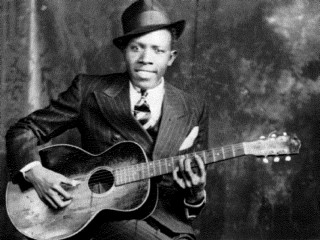
Robert Johnson biography
Date of birth : 1911-05-08
Date of death : 1938-08-16
Birthplace : Hazlehurst, Mississippi, U.S.
Nationality : American
Category : Arts and Entertainment
Last modified : 2010-04-27
Credited as : American blues musician and singer, Guitarist, Eric Clapton
0 votes so far
Johnson's songs, vocal phrasing and guitar style have influenced a broad range of musicians; Eric Clapton has called Johnson "the most important blues singer that ever lived". Johnson was inducted into the Rock and Roll Hall of Fame as an "Early Influence" in their first induction ceremony in 1986. He was ranked fifth in Rolling Stone's list of 100 Greatest Guitarists of All Time.
Robert Johnson was an influential Mississippi blues singer and songwriter who supposedly sold his soul to Satan "at the crossroads" in exchange for his remarkable talent on the guitar. Born and raised in Mississippi, he started playing blues guitar in the late 1920s. His wife and child died in childbirth around 1930 and he is said to have devoted himself to the guitar. Part of the crossroads story stems from a report that he dropped out of sight for a while in the early 1930s and returned a much-improved guitarist. In 1936-37 he recorded at least 29 songs in Texas (San Antonio and Dallas), then returned to Mississippi to play and sing in clubs and bars. His mysterious death at the age of 27 added to the legend: on the night of 13 August 1938 something happened to Johnson in a bar in Greenwood, Mississippi and he died three days later. Maybe he was stabbed, maybe he was poisoned or maybe the devil collected on his debt -- nobody knows for sure. In 1986 he was inducted into the Rock and Roll Hall of Fame as an early influence, and his songs have been covered by several rock stars, including Eric Clapton and The Rolling Stones.
His songs include "Crossroad Blues", "Me and the Devil Blues" , "Terraplane Blues", "I Believe I'll Dust My Broom", "Sweet Home Chicago", "Come on in My Kitchen" and "Walkin' Blues" - all acknowledged classics.
Extras : In 1994 the U.S. Post Office issued a stamp in his honor. The story of his career was fictionalized in the 1986 film Crossroads. He's not the same Robert Johnson who founded Black Entertainment Television.
















